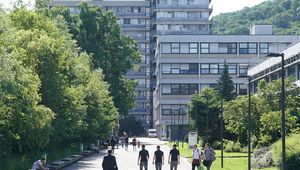Prof. Dr. Frans Mulder is not only head of the Institute of Biochemistry at the JKU, he also conducts researches and teaches.

What is your area of research?
Univ. Prof. Frans Mulder: We are studying biochemical processes by determining the chemical and three-dimensional structures of molecules using spectroscopy (= like a 'fingerprint' from material in response to electromagnetic waves, much like the way spectral lines of a star reveal something about its elements). In addition, we are using our expertise in the area of physical chemistry to better understand our observations as part of a quantitative framework, namely kinetics and thermodynamics.
What exactly is your inaugural lecture about?
Univ. Prof. Frans Mulder: My inaugural lecture is about how the realms of physics (quantum mechanics, spectroscopy) and chemistry (kinetics, thermodynamics) can be used to study and understand biologically important molecules and processes.
What do you find fascinating about this area?
Univ. Prof. Frans Mulder: The fact that we can actually see the ‘invisible’ world of atoms and molecules, and thereby better understand and rationalize the world around us.
Why is this research even necessary, meaning how will it improve our lives?
Univ. Prof. Frans Mulder: Knowledge improves our lives and we become more enlightened! Knowledge has an intrinsic value in and of itself. Research enables us to compile and structure our knowledge. Nature is beautiful and magical and through science, nature becomes more comprehensible.
Naturally, I could also say that our work results in understanding normal, healthy cellular biology and that our research contributes to a better understanding the molecular origins of disease. In addition, understanding biomolecular processes fuels biotechnology. These are the derived values of applied utility, obtained by conducting base-knowledge research.
Why should students take your classes?
Univ. Prof. Frans Mulder: This one is easy: Unlike profit or power, knowledge is to be shared. Teaching and education is the joy of sharing what you know in order to benefit students.
What are you currently working on?
Univ. Prof. Frans Mulder: Many ongoing projects are currently focused on a fundamental understanding the role of protein dynamics plays in cell function. Rationalizing drug development or enzyme activity is difficult because we do not understand the role of dynamics and its related quantity, entropy.
What are your hobbies?
Univ. Prof. Frans Mulder: I enjoy a variety sports, especially rowing. I also enjoy music and going to concerts.
What else do you want to do or achieve in your life?
Univ. Prof. Frans Mulder: Honestly, I have never really thought about that question before.
 Go to JKU Homepage
Go to JKU Homepage










